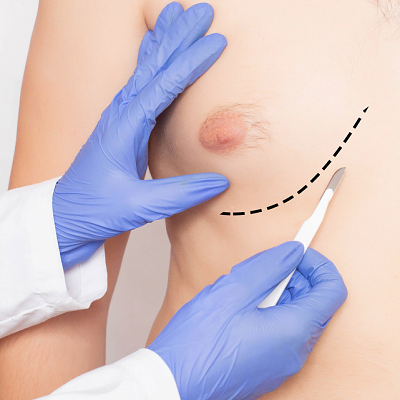
Gynecomastia, often colloquially referred to as “man boobs,” is a condition characterized by the enlargement of breast tissue in males. While the physical manifestation of gynecomastia in Islamabad is evident, its implications extend beyond the cosmetic realm, challenging the perception that it is merely a cosmetic concern.
In this blog post, we delve into the multifaceted nature of gynecomastia, unravelling the physical impacts and how to treat it. So, take a moment and read the following details!
Reasons For Gynecomastia:
Gynecomastia, the enlargement of male breast tissue, can occur due to various reasons:
- Changes in estrogen and testosterone levels.
- Hormonal fluctuations during adolescence.
- The decline in testosterone levels in older men.
- Some drugs include anti-androgens and certain antidepressants.
- Chronic diseases affecting hormone metabolism.
- Certain plant extracts in supplements or products.
- Excessive alcohol, marijuana, or illicit drug use.
- Excess body fat leads to hormonal changes.
- Family history of gynecomastia.
- Idiopathic cases where the cause remains unidentified.
Psychological Impact:
Beyond the physical inconveniences, gynecomastia can have a profound impact on an individual’s mental and emotional well-being. The societal norms and expectations surrounding masculinity can amplify the psychological toll of gynecomastia, as affected individuals may grapple with feelings of inadequacy, embarrassment, and diminished self-esteem.
The pressure to conform to conventional standards of masculinity often perpetuates a culture of silence surrounding gynecomastia. Many individuals may avoid seeking medical attention or discussing their concerns due to fear of judgment or societal stigma. Consequently, the psychological burden of living with gynecomastia can be isolating, exacerbating feelings of shame and self-consciousness.
Research indicates a correlation between gynecomastia and mental health issues such as depression and anxiety. The psychological impact of gynecomastia is not limited to self-perception; it can extend to interpersonal relationships, affecting intimacy and social interactions. Addressing the psychological dimensions of gynecomastia is crucial for fostering a holistic approach to its management and treatment.
How To Treat Gynecomastia?
The treatment of gynecomastia depends on various factors, including the underlying cause, the condition’s severity, and any associated symptoms. Here are several approaches to treating gynecomastia:
Lifestyle Modifications:
- Weight Management: In cases where obesity contributes to gynecomastia, adopting a healthy lifestyle that includes regular exercise and a balanced diet may help reduce excess body fat, decreasing breast tissue.
Medication:
- Hormonal Therapy: If gynecomastia is due to hormonal imbalances, certain medications may be prescribed. Selective estrogen receptor modulators (SERMs) like tamoxifen and aromatase inhibitors can help regulate hormone levels and reduce breast tissue.
Surgical Intervention:
- Liposuction: This method involves using a suction device to remove excess fat from the breast area. Liposuction is particularly effective for cases where gynecomastia is primarily due to excess fatty tissue.
- Glandular Tissue Removal: Surgical excision may be necessary for cases where glandular tissue is the main culprit. This involves making an incision and removing the glandular tissue.
Combination Therapies:
- Liposuction and Excision: In many cases, liposuction and glandular tissue excision may be performed to achieve the best results, addressing fatty and epithelial components.
It’s essential for individuals experiencing gynecomastia to consult with a qualified healthcare professional at SKN Cosmetic Clinic Islamabad for a thorough evaluation and personalized treatment plan. Self-diagnosis and self-treatment are not recommended, as the effectiveness of the treatment will depend on the specific characteristics and causes of gynecomastia in each case.
The Bottom Line!
In conclusion, gynecomastia is far from being just a cosmetic issue; it is a multifaceted condition with physical, psychological, and social dimensions. Acknowledging the impact of gynecomastia beyond its visible manifestations is crucial for fostering a compassionate and informed approach to its management.
By dispelling stereotypes, encouraging open conversations, and promoting inclusive healthcare practices, we can collectively contribute to a society that recognises the holistic nature of gynecomastia and supports those affected in their journey towards physical and emotional well-being.









